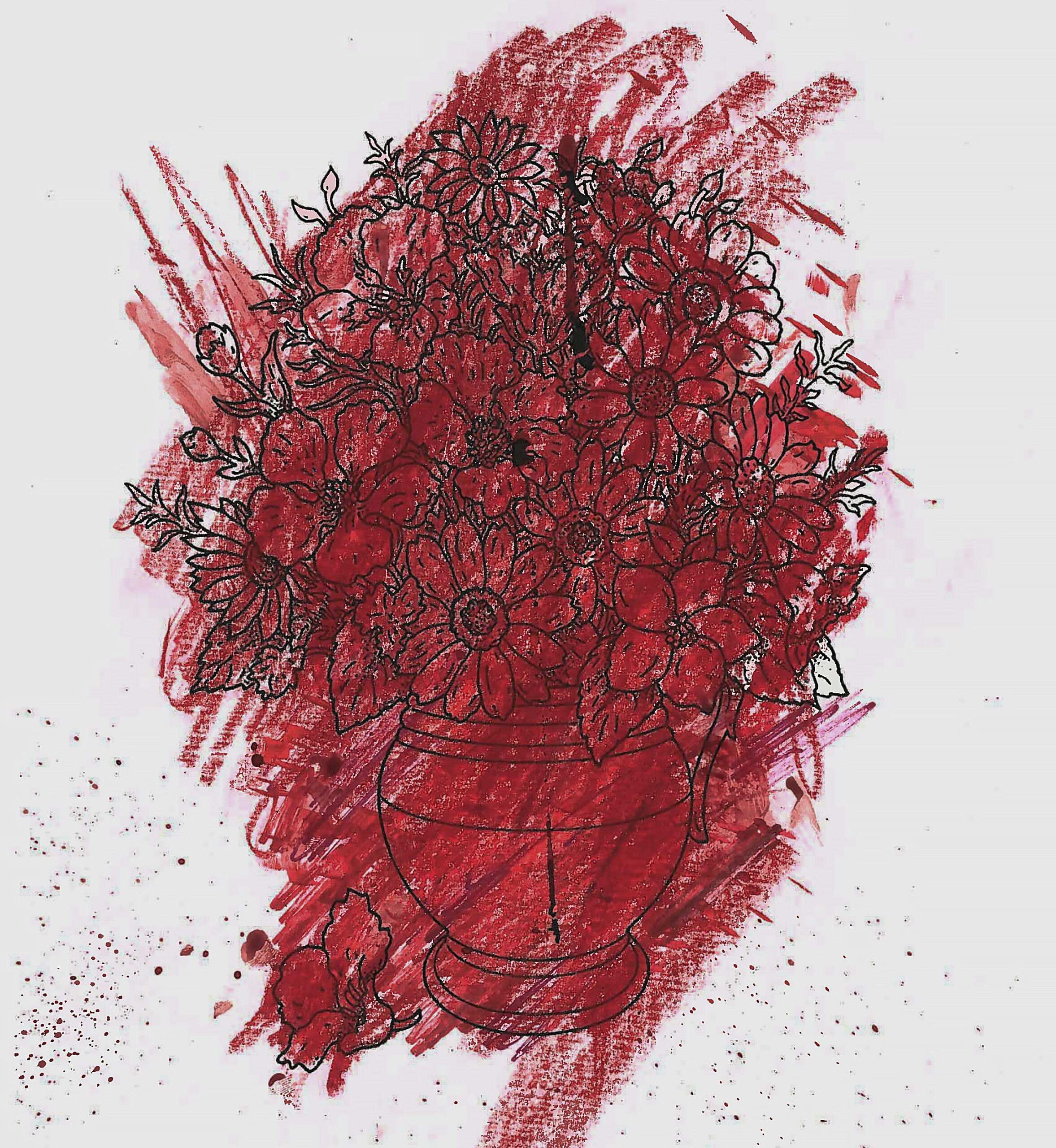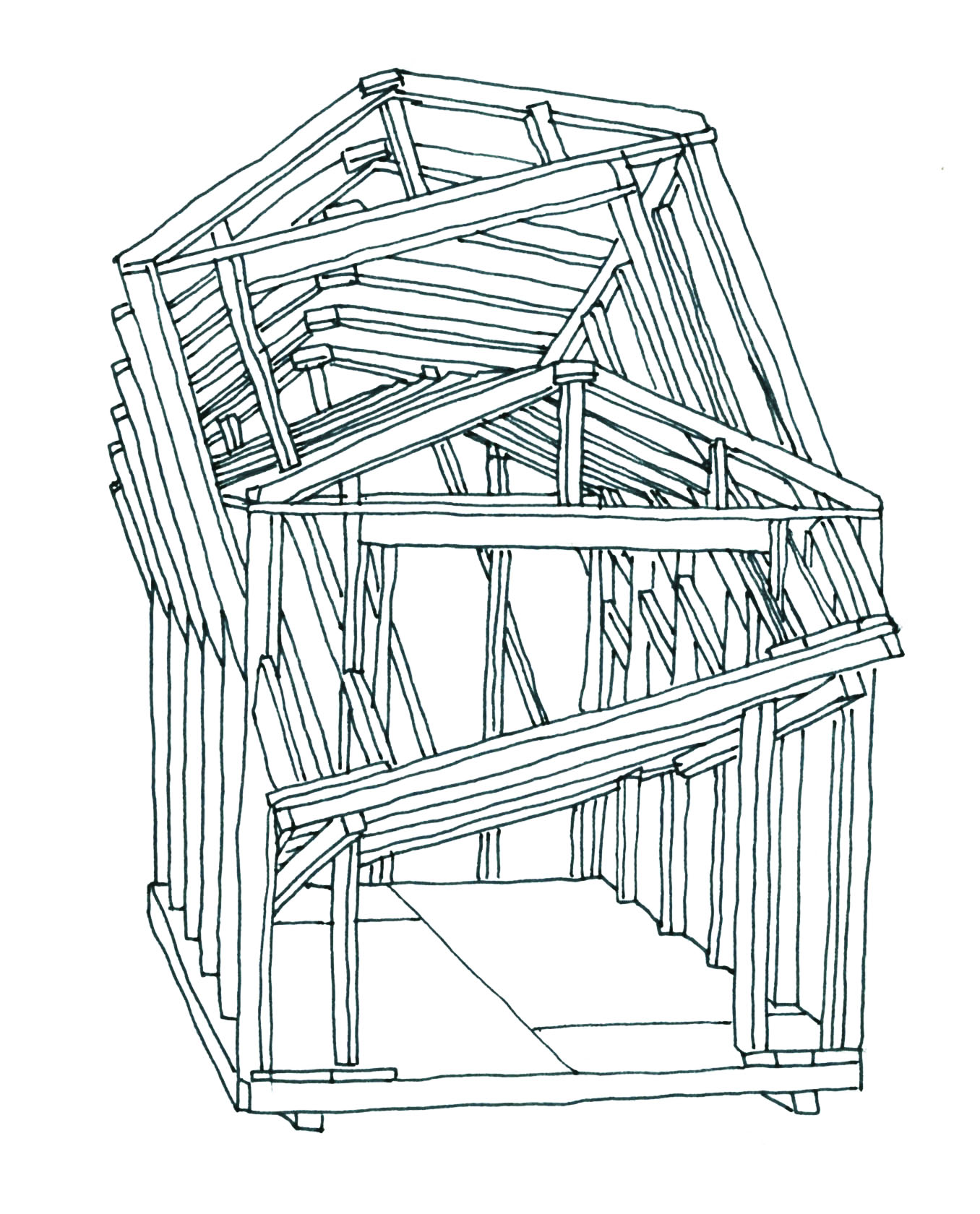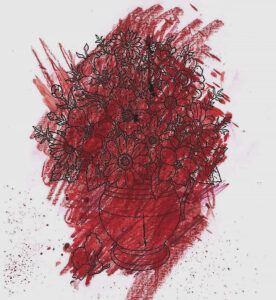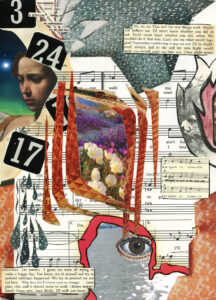Fishing for Mermaids
by Kate Tighe-Pigott
Jurgen the Giant invites four of us on the fishing trip, “to balance the boat,” he says, winking. It’s late afternoon and all the guests, my husband and myself included, are bleary-eyed from naps. The sea sparkles under the beached paraw, a kind of double outrigger sailboat native to the Philippines. The boatman lowers the ladder, which is only about ten inches wide and made of bamboo. We, or at least I, wonder if it will hold Jurgen. “You guys go first,” Jurgen says.
We pile ourselves into the bow-most seats, then hang on, laughing, as the back of the boat dips, raising us high into the air, while Jurgen climbs in. He is Norwegian, a technical and very real giant. Still, he fits himself into the far end of the boat, butt on floor, legs dangling starboard, while portside his blond pumpkin head lolls hungover, a balled up T-shirt on his face to prevent burning in the hot Philippines sun.
The boatman pushes us away from the sand, over the bleached coral, with a long bamboo pole. I breathe the salt air and admire the islands’ coconut covered mountains in blue and green.
At the bow with us is Mohammed, a Saudi dermatologist, and his Filipina wife or girlfriend (“Or second wife,” my husband jokes). The Filipina woman, maybe on account of her discomfort with English, or with white people, doesn’t introduce herself. We nod to each other, but neither do I ask her name. Mohammed calls her “Mahal,” but mahal means “love” in Tagalog. Also “dear,” which, I reason, could be her name. I mean, I’ve met women called “Love” and “Love-Love” and “Babes” and “Baby” and “Blessing” and “Princess”; but then, Occam’s razor: probably just a pet name. I feel confused, then guilty, then avoid addressing her altogether.
“The leaders of our countries are meeting today,” my husband says to Mohammed. “Let’s hope it all goes well.” He clasps his hands together, as if in prayer. Abroad, my husband gestures more.
“Inshallah. For the peace of the world,” Mohammed says, face tensing for a moment. Then he brightens. “And here we are too! Meeting each other! We even have a red carpet!” The floor of the boat is red rubber foam stapled to the wood. They laugh and clap each other on the shoulders, then launch into their official introductions: explanations of their companies’ revenue models.
Jurgen lifts his T-shirt off one eye, fixes that eye on me. “I was a mess this morning, wasn’t I?” I assume this is his way of apologizing.
“Don’t even,” I say, swatting the air. “It’s not even a thing.”
What happened this morning was that I was up early, drinking Nescafé on the hotel’s patio, and thinking about how climate change will engender the end of coffee, and how murderous the week after that will be. I was testing out the idea that humanity is just the thinnest scrim of civility overlaying total barbarism—in this case, caffeine-induced civility. The sky went from dark to pale, like the inside of a mussel shell. A prostitute in a sparkly silver dress, heels slung over her shoulder, walked in the surf from the last resort on the beach, back toward Sabang.
What was she was thinking about, this woman? Probably what any woman would be thinking who was walking alone in the surf in the early morning. About God, the universe, and everything. Ways to be happier. Lost loves. Maybe, like me, about patterns of consumption and the End of Days. Or just thinking about the day ahead. I smiled when she noticed me and she picked up her pace. I was doing it again, assuming camaraderie with people who didn’t feel camaraderie with me. She was probably just thinking her own thoughts.
Somewhere near this epiphany, Jurgen stumbled back to the resort, eyes red, dress shirt unbuttoned. He mounted the stairs from the beach to the hotel’s patio.
“Morning,” I said, raising my cup.
“Is it?” He shrugged, sheepish, and knelt next to my chair. His big head came to rest on his folded arm on top of the table. His eyes closed. Booze and sweat evaporated off him. Had he fallen asleep? Would this table hold him?
I put my hand to his temple. “You okay?”
“Tell me,” he said, eyes still closed. “Why are you women so fucking tiny?”
Jurgen was the first person we met when we moved to Manila a year ago, but I’d never thought about it like that, had never considered the biological limits to Jurgen’s love life. What could we even do for Jurgen? Perhaps the prostitutes he frequented danced around his penis like a maypole. I chuckled at the thought.
Jurgen hauled himself into a chair, put his enormous hands on my shoulders, and looked into my eyes. His pupils dilated, which, because he’s a giant, felt for me like falling into a black hole. My body flushed, nipples hardened, breath grew shallow. His desire was not for me, I knew. He was drunk and frustrated and I was the last vagina of his evening. He shook me. “I would break you in half,” he grumbled, before staggering to his room.
My husband and I almost had sex last night. I coaxed him away from the El Galleon’s bar around midnight. We were both drunk. Well, all three of us: Jurgen was also drunk, but we left him at the bar. In the hotel room, I pulled my dress off, cracked open two bottled waters, and handed one to him, thinking, this plastic is so terrible for the planet. I could feel my husband watching as I moved through the room in my underwear. It was nice, for a minute. All I’d ever wanted.
He pulled out his iPhone and started recording.
“Stop,” I said. I grabbed my dress to cover myself, flopped into the hotel room’s armchair.
“You look beautiful.”
“Please. I don’t like it.” An ex took pictures of me naked. He didn’t put them on the Internet (that I know of), but I feel uncomfortable that he has them, given we’re estranged. Not that I am planning to break up with my husband—I just didn’t want to be replicated, is all. What if he masturbates to this instead of ever touching me again?
My husband, still recording, pulled at my dress, fought me for it.
“Stop,” I said, begging. His smile was greedy. He wasn’t looking at me anymore, but at his screen. I chucked water at him from my water bottle. He soured then, worried I’d ruined his expensive piece of technology.
We don’t use fishing poles. Instead, the fishing line is wound onto these large spools, “Filipino style,” Mahal—I’m just pretending that’s her name—says behind her hand. Two small hooks are notched near the end of the line. An iron weight anchors it. We spear tiny pieces of gray shrimp chunks from the boatman’s cooler and throw the anchors overboard, letting our spools run out.
I’ve never loved fishing. Also, I am a hypocritical meat eater, in that I feel terrible guilt about the animals, the living conditions of the animals, the planetary impact of my dietary choices—and yet do really nothing, beyond shelling out more for organic and free-range. Nothing that would involve real sacrifice.
To the excitement of all, Mahal feels a tug. She hauls the line up with her hands, throwing reams of it at Mohammed, who is laughing. She pulls a clown fish fingerling into the boat and everyone claps. Mohammed and my husband take photos of Mahal with her catch. My husband takes a photo of the couple together with the small fish. “Nemo!” Mohammed says, poking it. Its fins move impotently, in what must feel like impossibly heavy air, as it suffocates. Eventually the boatman unhooks it—cartilage tearing in its jaw. The boatman throws it back into the sea. “No good for eating,” he says. I look overboard for signs of life, but the clown fish bobs away.
Next, I catch a longhorn cowfish, which has a kind of boxy face and a mostly gray body with blue and yellow spots. The guide giggles and dances on the deck.
“Good for eating,” Jurgen says, explaining the boatman’s glee.
I know it’s a longhorn cowfish because I saw some on my dive this morning (after the encounter with Jurgen), hiding in dark orange and purple coral. My dive instructor and I started out along the sandy plain behind the floating bar off Sabang beach, saying hello to the loggerhead turtle family. They’d been there every morning this week. The turtles were the size of small lounge chairs, and bowed to eat, unconcerned about our presence. I could’ve reached out and touched one, but that’s not what scuba is about. Scuba is about witnessing. Breathing.
The best thing I saw this morning was the moray eel with its strange underbite. The second best were the lobsters. Purple and gold, they danced across the sea floor, tails skyward for steering. I’d only ever seen them sludge around in those supermarket tanks.
I was encouraged by the new coral. And the reefs weren’t completely blanched, though if I were talking to an expert they’d say it was sad compared to what it was like in the sixties. Riding back on the boat with my dive instructor, I asked if he’d seen changes in the coral. “Coral is sometimes damaged in typhoons,” he said. “Also by very sunny days.” He glanced at the sky. He meant climate change, the scariest thing I can think of. I like scuba because, even though it makes me sad to think what we have done to the planet, being with the fish makes me less palpably afraid. My life will end too. All our lives will. We’re in this soup together.
The regularity of the enforced breathing helps, too, I’m sure.
Fifty minutes of silence doesn’t hurt.
Plus scuba guys don’t sexualize me—preoccupied as they are, I’m sure, with the fading majesty of our oceans.
“Hold him up,” Mohammed says, pulling out his camera. This very morning, in my tank and fins, I probably met the little cowfish now spinning on my line. Poor guy was minding his own business, about to eat a shrimp nugget, go on with his day. My husband too is taking pictures. I aim for a smile that’s more demure than a grimace.
Next, my husband hauls up a puffer fish. The puffer fish’s bulbous belly makes me laugh. I’m relieved it’s not a fingerling, that it’s not beautiful. The guide comes to unhook it. He clucks his tongue. “Poison,” he says, and crushes its rubbery body in one hand. The fish’s eyes bulge. Its bones crack. We are all shocked. “No good for eating.” The guide slams the puffer fish against the hull of the paraw. It flops into the sea and floats away on the tide.
“Why did you kill it?” Mohammed asks.
“Poison,” the guide says again.
“Ah,” says Mohammad, and then, mostly to us, “He could have had a good life!” We laugh nervously.
“That’s what I’m going to do if you ever get cancer,” my husband jokes.
Mohammad hasn’t caught anything yet. “It’s my turn!” he insists. “I want to catch something big! A tuna. Or a marlin. Maybe a shark!” He holds his hands out wide over his knees, measuring the fish of his dreams. The men laughed conspiratorially at the scope of his want.
“I know the place,” Jurgen says. He whistles to the boatman, who runs down the side of the boat, pulls some ropes and swings the sail, putting us out toward deeper water.
At this new fishing spot we switch out the small hooks for larger hooks and use honeyed lobster tails for bait. Mohammed is excited. I feel nervous and ill. My husband smiles at me as if to say, Hang in there, Babe.
Speaking of women named Babe, I once knew a thin, blond woman named Nancy, who married a guy whose ex-wife was also a thin, blond woman named Nancy. At the wedding, Nancy officially changed her name to Baby, like from Dirty Dancing’s “nobody-puts-Baby-in-a-corner” Baby. On the groom’s cake, it said, “Congratulations, Russ and Baby.” I debated whether I could call Nancy “Baby,” but decided I couldn’t, and so began not to address her at all.
To Mohammad’s frustration, and mine as well, I feel the first tug. It pulls me to my feet. Jurgen rises to help me, directing everyone else to the far end of the boat, for balance. I hand him the fishing line, and he pulls arm over enormous arm. I lean over the side to see what we’ve caught. These are tropical marine waters. It could really be a marlin or a shark. It could be a dolphin. Or, God forbid, one of the loggerheads I said hello to this morning.
I see a flicker of white in the black water and watch with growing horror as the face that flies toward the surface begins to look remarkably like my own.
My hook has the mermaid behind the lower jaw, right under her ear, so her face is tipped skyward, and to the side. She has long dark hair, a long white throat and breasts, you know, not even with seashells on them. Her tail is blue and yellow with a false eye at the end. Blood mixes with seawater and runs in pale pink rivulets over the mermaid’s collar bone. Her eyes blink in the sun and her arms hang limp, though her hands open and close at her sides. Her rib-flaps tense as she starts to suffocate.
We—or at least I—stare in wordless horror. And amazement.
“Yes!” says Jurgen, laying the creature across his lap. “Good catch.” He grabs the mermaid’s hair at the nape of her neck in order to extract the hook from her, then tosses her into the front of the boat. Her head thunks, hard. Jurgen scoops a bucket into the sea and throws the water on her. “Keeps it fresh,” he says.
My husband shrugs at me, as if to say, He’s a giant! I don’t know. Mohammed nods slack-mouthed, to square himself, I assume, with this giant level of cultural difference. Mahal giggles behind her hand. Queasiness rises in me, together with the awareness that I may be acting like a white lady. If Mahal is cool, I’m going to be cool.
Jurgen is already rebaiting my line. “No thank you,” I say, handing the reel over. The blue and yellow tail furls and unfurls at the front, false eye beckoning me, as the mermaid struggles to breathe.
To his relief, Mohammed catches the next one: red and black striped with Kool-Aid colored hair. People clap, and Jurgen helps him hold the line while my husband and Mahal take photos. Like the other mermaid, her arms move slowly. How crazy must gravity feel if you are used to the buoyancy of water? “This one is poison, though,” Jurgen says, disappointed.
On the other hand, maybe Mahal has to be cool in order for Mohammed to keep sleeping with her. She might be in a bind. I’m less in a bind so I grab Jurgen’s arm. “Don’t kill her,” I say. “Jurgen, please.”
He rolls his eyes. The mermaid gurgles as Jurgen pulls the hook from her throat. She snaps her jaw and gets him on the hand. “Jesus!” he yells. He drops her onto the railing, kicks her overboard.
“Jurgen!” I say and grab his arm.
“Poisonous.” He chides me. “Not venomous.” I feel like a dummy. He dips his hand into the water.
“She’s going to warn the others,” Mohammed jokes. Perhaps she does, because—even though we stay out for another two hours—we don’t catch anything more. The sun sinks in the sky, filled now with puffy gray clouds. Mohammed offers everyone digestive cookies and my husband takes him up on it. Crumbs falling, they make jokes about Donald Trump. Mahal and the boatman chat in Tagalog.
I join Jurgen at the back of the boat. “Chumming the water?” I say.
“Mohammed wants a shark.”
“How many mermaids are you going for?”
“You can freeze them,” he says.
“I’ve been thinking about your problem,” I said. “From this morning.” He smirks and cracks his neck, readying himself for the conversation. “Aren’t there any women giants?”
“If you meet one, give her my number.”
“You must have a mum.”
“I’m not fucking my mum!” Jurgen shouts. The others look at us. We both laugh. I bury my face in my hands.
We wave away the others’ interest, and wait until their conversations start up again. I want to ask more questions, want to know what it’s like for him. What does he do with those prostitutes? How does he find pleasure? It’s too intrusive. “You’ve never broken anyone in half, have you?”
He chuckles, then sighs. In his sigh, I hear years of frustration, a lifetime of want. It must be horrible to want so much. A moment later, he whistles, yells “Boss!” to the boatman, and spins his index finger in the air, signaling, Let’s go back. Jurgen invites us all to a cookout that night.
I don’t want to go. I don’t want to eat the mermaid. I am really on the verge of considering going all-veg for real finally, but how do you explain that to a giant, who has just shown you something of a miracle?
“Tell him I’m sick.” My husband is showering for dinner, and I’m sitting on the sink. “Or tell him we had a fight and I’m in a strop.”
“Are you really just going to sit in the room?” It sounds lame, the way he says it. We are in paradise. We have a once-in-a-lifetime opportunity awaiting us on the beach.
“I’ll watch a movie.” I have Legally Blonde and The Imitation Game on my computer. “Or read.”
“Suit yourself,” he says. “I’ll have a guys’ night with Jurgen and Mohammed. That guy’s cool.” I don’t like how he says guys’ night and decide to dress for dinner.
When my husband and I first met, the sex was like chasing. He’d whisper things in my ear. I wanted everything he said, but I’d still try to get away. To tease. To delay our gratification. We’d knock pictures off the walls. Sex with him was the only time I wasn’t thinking, the only time my mind was a void, the only time I could see the sparks of new stars, and feel the flash-in-the-pan we are. The only time I could feel okay about dying. Sex with other men had promised the same, but had never delivered: they were clumsy or callous or cautious.
But now, whenever he shows the least bit of interest in me, I come at him like a starved person, like a black hole. So much for the chase. A friend once suggested I seek therapy for my early sexualization, which wasn’t one hundred percent consensual, though I’m sure it was par for the course. I sometimes wonder if the real answer is that I am just defective—my skin and bones a container for a vast emptiness, a roaring piece of space.
Aren’t we all made this way?
My dress is an off-the-shoulder pink floral thing with ruffles. It’s short in the front and long in the back, and I wear it with espadrilles. I tease up my hair in the middle and then braid it down the side. I apply lotion to cool my sun-scorched shoulders and nose, line my eyes with blue, then shadow them with gold. I notice delicate wrinkles. A Korean boss once told me he’d prefer an Asian wife to a Caucasian wife, because, “when white women age, they look so haggard.” Honest to God. Sometimes the word haggard pops into my head and I have a sad, private chuckle.
Here’s how to cook a mermaid: bisect her, cutting her in half at the tail, separating surf from turf. Pull out her internal organs, truss up her arms, like you would a turkey. Take off her head or else put an apple in her mouth—people do it both ways—but if you leave the head, braid up the hair tight. No one wants to find a stray hair! Stuff her tail deep inside her ribs, douse her in butter, salt, pepper. Et voilà! Put her on the grill. The fat from her breasts bastes the upper tail meat, which is the delicacy. One benefit to leaving her head on is that, on the platter, she looks just like herself—only foreshortened. And also cooked.
Cooked, the mermaid’s skin is crispy and golden brown, much like a roasted chicken. I fill my plate with potatoes, thinking I’ll discretely skip the main course. I fill my cup with red wine. I kick off my shoes. The sand is soft and cool under my feet. In it, our plastic chairs list too far to the left or right.
Jurgen stands at the center of the table, cutting the meat. She comes apart in flaky white steaks, like a swordfish, and she smells like charcoal and salt and chili and lemon and lavender. Intoxicating, really.
Mohammed kisses his pinched fingers. “Delicioso!” He holds up his plate, then Mahal’s. Each one of us is going to get a whole steak. That’s a lot.
When Jurgen takes my plate, I say, “Just a small—just the tiniest. Just a—” He doesn’t hear or else doesn’t acknowledge my protests, and gives me a whole steak. I should have been louder. I should have been clearer.
The mermaid steak covers the rest of my food, fills the plate. It will be impossible to hide, though I could pawn some of it onto my husband’s plate, lose some of it in the sand.
Jurgen sits at the end of the table, at my left elbow. I face the sea, in which the half-moon bobs, replicated infinitely. Jurgen raises his glass, and we follow. “To good friends, good food, beautiful women. All the blessings.” I make eye contact with Mahal—did she note too that we’re not considered “friends”? That he listed us after the food, like dessert? I wonder what her real name is.
“Mabuhay!” Jurgen says. We clink glasses all around. Jurgen, Mahal, Mohammad, the boatman—whose name I also do not know: Gerry? Ronny? Mahal said it this afternoon—with his deft and calloused hands. Finally, I clink with my husband, seated on my right, who says, “Mabuhay, Lady” and kisses me theatrically. We may never have sex again.
We drink. People dig in. “Oh my god,” my husband moans. “Really incredible!” says Mohammed. Mahal chews behind her hand, nodding at both the boatman and Jurgen. “Masarap!” she says. Conversations bubble and rise.
“What do you think?” Jurgen says to me. He nods, his eyes the size of my fists.
“So good,” I say.
“Liar,” he says. “You haven’t had a bite.” I’m grateful no one else is paying attention. I stick my fork into the steak. The meat flakes off, creamy and fluffy and aromatic.
Warmth and softness. Saltiness, heat. My face flushes. She’s tangy and fresh and formerly alive, and I feel a hunger flare in me, like I’ve been missing some essential minerals only found in this other body. I take another bite and then another. I regret having taken potatoes, which, compared to the mermaid, seem loamy and dull. I pick the steak up by the bone and tear at it with my teeth.
“Woah, Honey,” my husband says. My hunger embarrasses him. Is mermaid caloric? I wipe the grease from my mouth with the backs of my hands and eye the rest of the meat.
“Try this part,” Jurgen says, breaking off the mermaid’s trussed-up arm, and handing it to me. The skin is crispy and salty and the meat underneath is moist and juicy, with—there it is again—lavender.
As I eat, a chemical thing begins to happen—a stupefaction, or perhaps I become animal—my mind singular in its message: More.
For most of dinner, I don’t notice my husband. When I do notice him, he’s telling stories I’ve heard already. The others, teeth purpled with wine, laugh and slap the table. Their chairs keel and pitch over in the sand. They’re all hugging. They’re all drunk. They’re stripping naked and running toward the sea.
When I can’t eat another bite, I lean against the back of my chair, let my belly distend, cradle it like a baby. I contain multitudes. A server refills my cup. My husband is too drunk to sleep with me tonight, not that I even could. I imagine myself dissected like those sharks on Shark Week. Or bisected—perhaps Jurgen could break me in half, as promised. From my husk would emerge, whole and happy, not just the mermaid, but the prostitute in the sparkly dress, Mahal (asking me to please call her by her real name), and a loggerhead sea turtle.
Jurgen leans toward me, rousing me from my reverie. I didn’t realize he was still here. “Satisfied?” he asks.
The joyful cries of the rest of our party float over the water and dissolve.
“Not yet,” I say.









